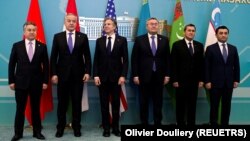The United States was the first country to recognize Kazakhstan’s independence in December of 1991. Ever since, the United States has been firmly committed to the sovereignty, territorial integrity, and independence of Kazakhstan – and countries across the region. On his recent visit to attend the C5+1 Ministerial in Astana, Secretary of State Antony Blinken reaffirmed the United States’ unwavering support for Kazakhstan to freely determine its future.
Secretary Blinken reiterated his endorsement for the full implementation of Kazakh President Kassym-Jomart Tokayev’s reform agenda announced last March.
“We look forward to seeing the additional concrete steps Kazakhstan will take to realize that agenda: expanding public participation in the political process, increasing government accountability, curbing corruption, introducing presidential term limits, and protecting human rights,” he said. “Those reforms are an important reason why foreign investors, including those from the United States, are increasingly turning to Kazakhstan. American businesses were among the first to invest here, injecting more than $50 billion into the Kazakh economy going back to 1991.”
Kazakhstan continues to be a valued partner in reducing the spread of nuclear weapons by dismantling Soviet-era missiles; contributing to peacekeeping operations from Lebanon to Mali; exploring the galaxy through space cooperation; and repatriating and rehabilitating more than 600 foreign terrorist fighters and their families.
The United States has demonstrated its commitment to the economic growth and development of Central Asia. Since June 2022, the United States committed $16.5 million toward food security in the region. The United States also set up the Economic Resilience Initiative for Central Asia, which provided $25 million to expand regional trade routes, establish new export markets, attract and leverage greater private sector investment, and provide people with practical skills for the modern job market.
During his visit, Secretary Blinken announced further assistance for the region:
“I’m announcing an additional $25 million for that initiative, a total of $50 million to build up the regional economy, and especially to make sure that people have the skills they need to succeed in this global economy. To further empower and connect the people of Central Asia, we’re launching an effort to increase English language proficiency for more than 1,000 young professionals in government and across civil society.”
The United States, Kazakhstan, Kyrgyz Republic, Tajikistan, Turkmenistan, and Uzbekistan are committed to continuing to advance shared economic, energy, environmental, and security goals.






